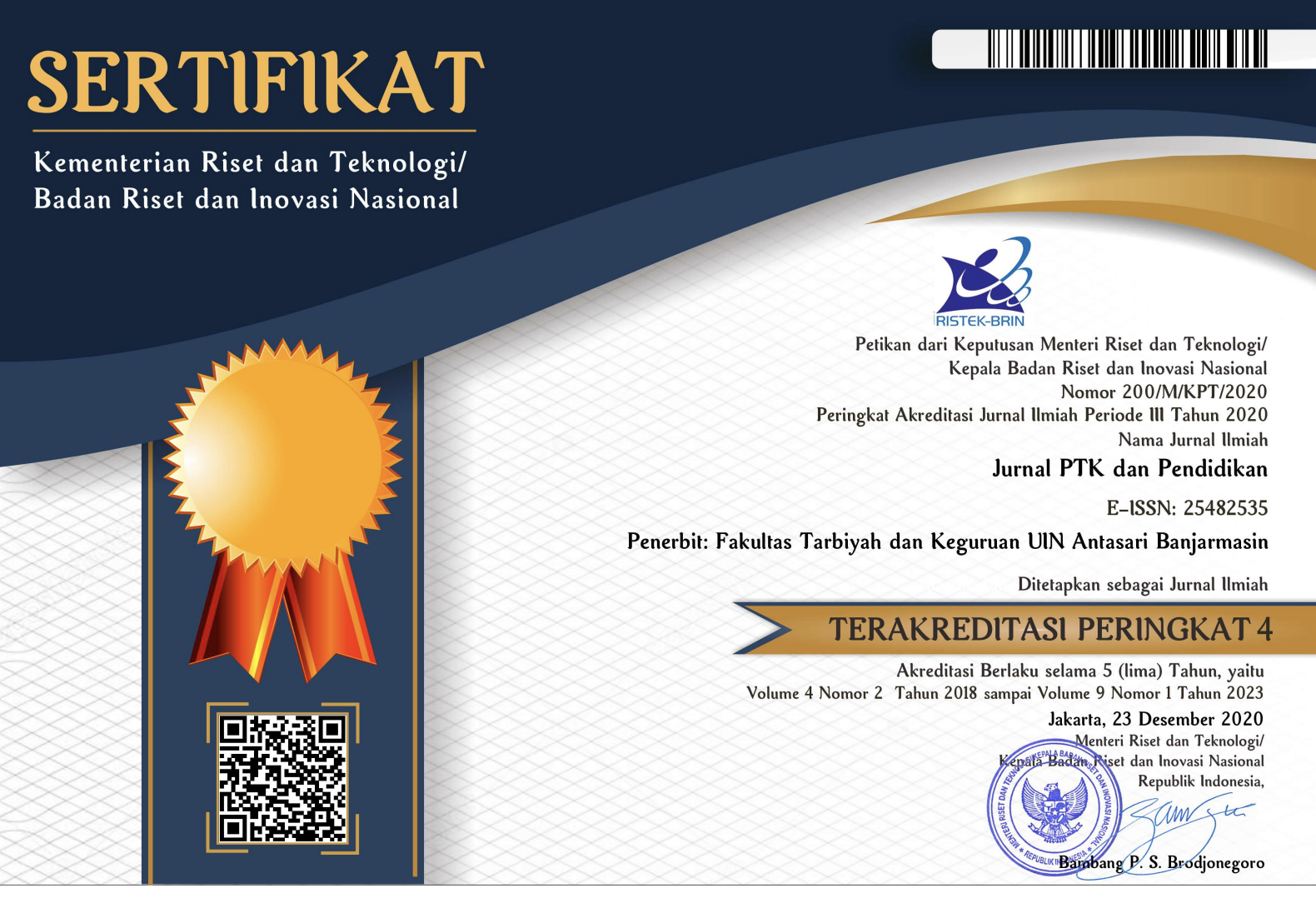DEVELOPMENT OF PROJECT BASED LEARNING ELECTRONICS MODULE ON INTERNET OF THINGS (IOT) MATERIAL WITH NODEMCU ESP32
DOI:
https://doi.org/10.18592/ptk.v10i2.13161Keywords:
Module; Electronics; Internet of Things (IoT); NodeMCU ESP32; Project Based Learning;Abstract
Based on observation sheets and interviews with Jambi University physics education students, it is known that there is no teaching material that can provide an overview to students about making Internet of Things (IoT) projects with NodeMCU ESP32 so that students still find it difficult in making Internet of Things (IoT) material projects with NodeMCU ESP32. This study aims to develop a project-based electronics module (Project Based Learning) on Internet of Things (IoT) material with NodeMCU ESP3. The method used is research (Research and Development) with the ADDIE model, including the analysis, design, and development stages. Module validation data is collected through a questionnaire sheet filled in by material validation and media validation. The results of material validation show that the module has a feasibility of 92% with a very feasible category, while the results of media validation show a feasibility of 90.16% with a very feasible category. Module trials were conducted on 27 Jambi University Physics Education students, which showed student perceptions of the module of 83.03% in the very good category. Based on these results, this module is considered feasible and effective as an alternative teaching material in learning electronics, especially on Internet of Things (IoT) material with NodeMCU ESP3 in university.References
Amri, Y., & Setiawan, M. A. (2018). Improving Smart Home Concept With the Internet of Things Concept Using RaspberryPi and NodeMCU. IOP Conference Series: Materials Science and Engineering, 325(1). https://doi.org/10.1088/1757-899X/325/1/012021
Arsyad A. (2011). Media Pembelajaran. 23–35.
Fajri, Z. (2018). Bahan Ajar Tematik dalam Pelaksanaan Kurikulum 2013. Jurnal Pedagogik, 05(01), 100–108.
Harpad, B., Meizal Saputra, R., Studi Sistem Informasi, P., Widya Cipta Dharma, S., Studi Teknik Informatika, P., & Moh Yamin, J. (2022). Sistem Monitoring Kualitas Udara Di Kawasan Industri dengan Nodemcu Esp32 Berbasis IoT. Jurnal INFORMATIKA, 12(2), 8–16.
Herawati, N. S., & Muhtadi, A. (2018). Pengembangan Modul Elektronik (E-Modul) Interaktif Pada Mata Pelajaran Kimia Kelas XI SMA. Inovasi Teknologi Pendidikan, 5(2), 180–191.
Imansari, N., & Sunaryantiningsih, I. (2017). Pengaruh Penggunaan E-Modul Interaktif Terhadap Hasil Belajar Mahasiswa pada Materi Kesehatan dan Keselamatan Kerja. VOLT : Jurnal Ilmiah Pendidikan Teknik Elektro, 2(1), 11. https://doi.org/10.30870/volt.v2i1.1478
Junaedi, I. (2019). Proses Pembelajaran yang Efektif. JISAMAR (Journal of Information System, Applied, Management, Accounting and Research), 3(2), 19-25.
Khoirurrijal, Fadriati, Sofia, Makruf, A. D., Gandi, S., Muin, A., Tajeri, Fakhrudin, A., Hamdani, & Suprano. (2022). Pengembangan Kurikulum Merdeka (Z. R. Bahar, R. Aqli, & R. Aqli (eds.)). CV. Literasi Nusantara Abadi.
Lestari, Reni Wiji, Pangestika, Rintis Rizkia, & Nurhidayati. (2023). Pengembangan Modul Proyek Penguatan Profil Pelajar Pancasila Tema Gaya Hidup Berkelanjutan untuk Sekolah Dasar. 1(2), 240–246.
Mappasere, S. A., & Suyuti, N. (2019). Pengertian Penelitian Pendekatan Kualitatif. Metode Penelitian Sosial, 33.
Mariati, M. (2021). Tantangan Pengembangan Kurikulum Merdeka Belajar Kampus Merdeka di Perguruan Tinggi. SiNTESa, 747–758. https://doi.org/10.53695/Sintesa.V1I1.405
Nasa’i, A., & Sari, N. R. (2023). Desain Media Pembelajaran Sebagai Pengembangan Sumber Belajar Pendidikan Agama Islam. Journal on Education, 6(1), 1707–1714. https://doi.org/10.31004/joe.v6i1.3126
Riduwan. (2016). Skala Pengukuran Variabel-variabel Penelitian. Alfabeta.
Setiadi, G., & Nurma Yuwita. (2020). Pengembangan Modul Mata Kuliah Bahasa Indonesia Menggunakan Model Addie bagi Mahasiswa Iai Sunan Kalijogo Malang. Akademika : Jurnal Manajemen Pendidikan Islam, 2(2), 200–217. https://doi.org/10.51339/akademika.v2i2.207
Widiyatmoko, A., & Pamelasari, S. D. (2017). Pembelajaran Berbasis Proyek untuk Mengembangkan Alat Peraga IPA dengan Memanfaatkan Bahan Bekas Pakai. Jurnal Pendidikan IPA Indonesia, 1(1), 51–56. https://doi.org/10.15294/.v1i1.2013
Suastika, I. Ketut, & Rahmawati, A. (2019). Pengembangan Modul Pembelajaran Matematika dengan Pendekatan Kontekstual. JPMI (Jurnal Pendidikan Matematika Indonesia), 4(2), 58. https://doi.org/10.26737/jpmi.v4i2.1230
Downloads
Published
How to Cite
Issue
Section
License
Copyright (c) 2025 Kiki Sefiawati

This work is licensed under a Creative Commons Attribution 4.0 International License.
- The right to publication of all journal material published on the Jurnal PTK dan Pendidikan website is held by the editorial board with the author's knowledge (moral rights remain the property of the author).
- The formal legal provisions for access to digital articles of this electronic journal are subject to the terms of the Creative Commons CC BY 4.0 DEED Attribution International (CC BY) license. This license enables reusers to distribute, remix, adapt, and build upon the material in any medium or format, so long as attribution is given to the creator. The license allows for commercial use.
- Printed and electronic published manuscripts are open access for educational, research and library purposes. In addition to these objectives, the editorial board shall not be liable for violations of copyright law.






